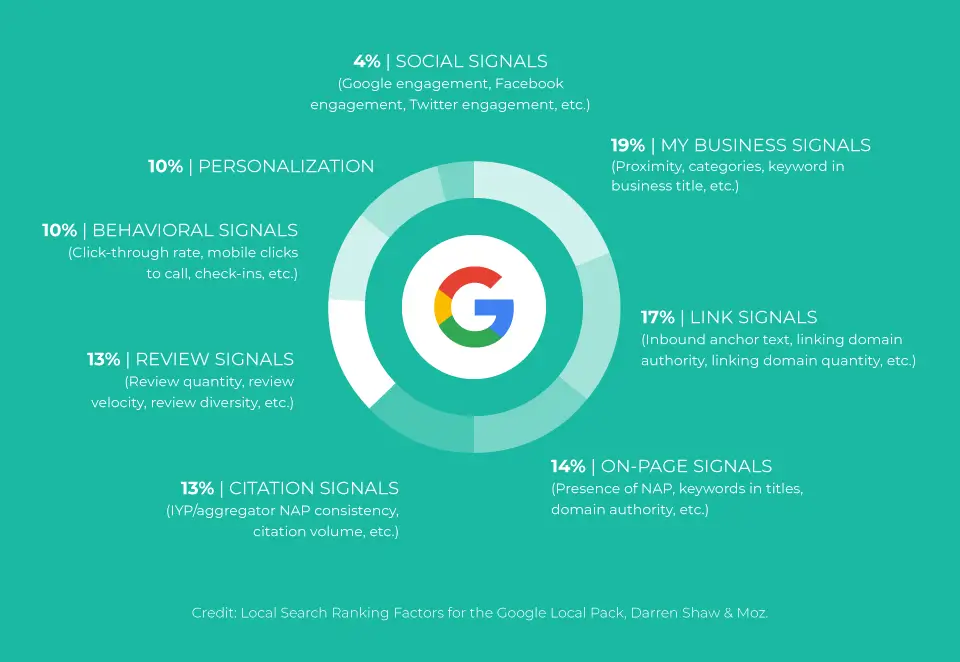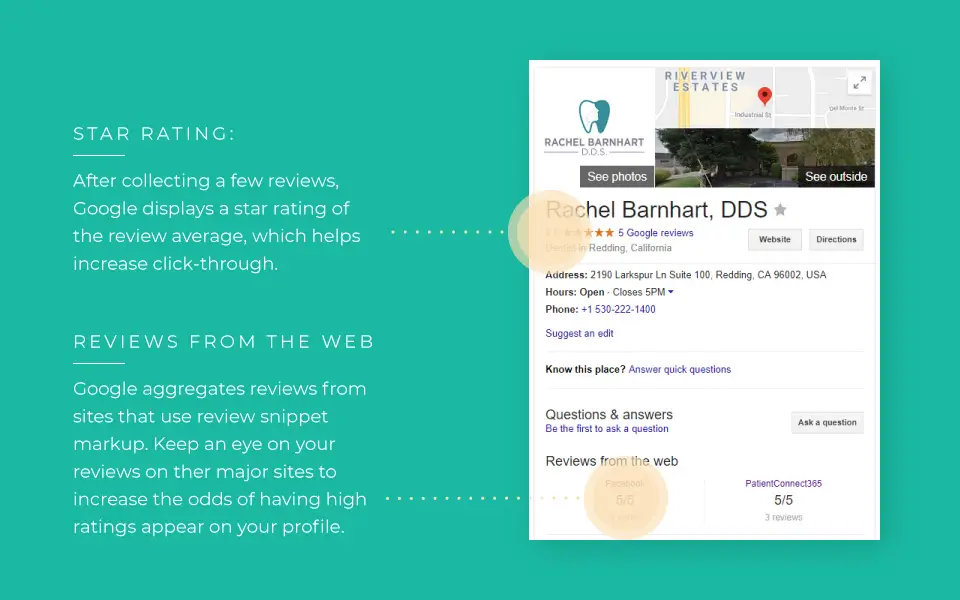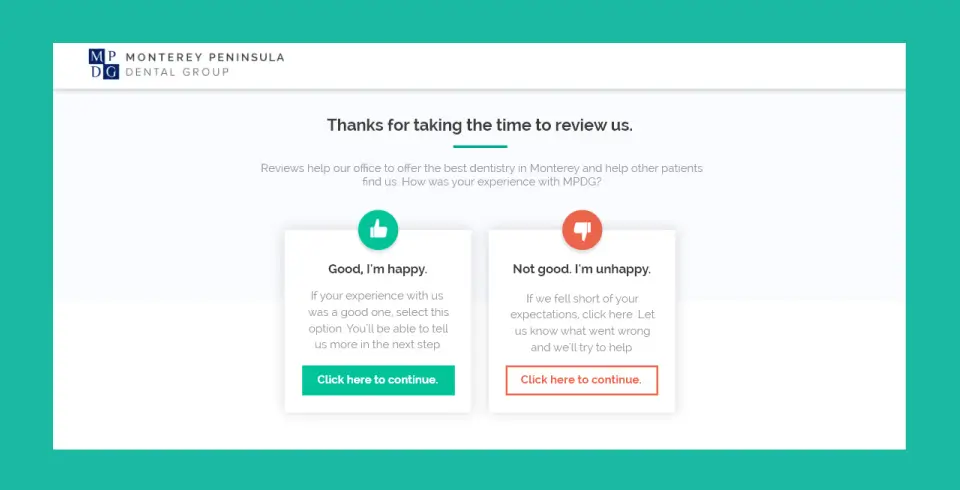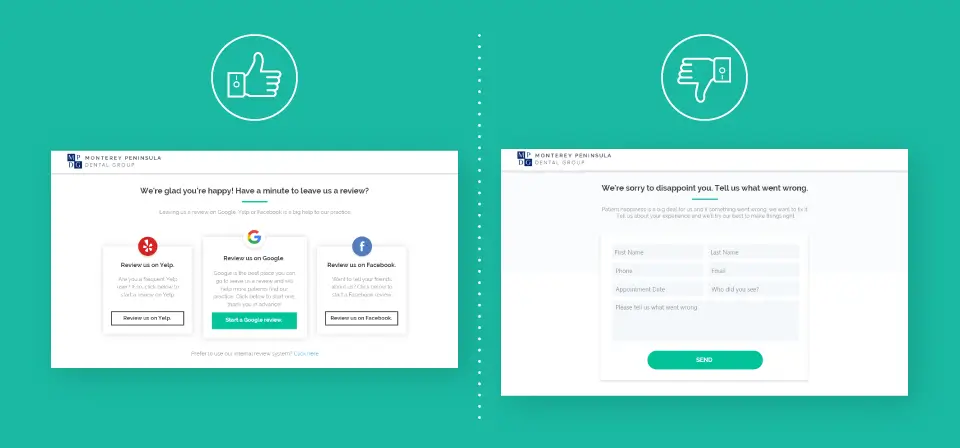Online reviews are an enormously important part of local SEO strategy. 92% of customers read online reviews and 88% trust reviews as much as they would a recommendation from a friend. With the importance of online reviews to consumers, it’s not shocking that they’ve been incorporated as a ranking factor in local SEO. In fact, the annual Local Search Ranking Factors study that’s produced annually by Moz found that reviews signals made up 13% of the overall local search ranking equation.
Getting great reviews should be an important goal of any professional firm, dental marketing strategy, or local search strategy, but getting reviews from customers and patients isn’t always the easiest thing to do. Certain online review sites are more important than others and each has different rules about what kind of reviews it accepts. For local businesses, all of this can amount to a hurdle of decision-paralysis standing in the way of gaining more reviews online. To help, we’ll provide a quick explanation of how reviews impact local SEO and touch on how to go about getting reviews on some of the most important reviews sites without running afoul of their rules.

What are the most important reviews sites for local SEO?
When it comes to reviews sites for local SEO, not all are created equal. Far and away, the most important place to collect reviews is on your Google My Business page, a profile that appears within local search results and displays Google reviews, as well as an aggregation of reviews from other sites around the web. Google reviews are great because they appear as a star rating on Google Business profiles, which are known to increase click-through. While reviews from other sites, like Yelp or Facebook, require a searcher to look for a business on that particular site, everyone uses Google, making Google reviews the most visible and most important type of reviews for local SEO.
In terms of local SEO, other sites matter beyond Google as well. Yelp is a fantastic place to collect reviews, as is Facebook. Industry-specific sites matter too. Having reviews on HealthGrades might help a medical practitioner, whereas sites like Avvo matter for lawyers.
When asking customers for reviews, it’s important for businesses to prioritize which sites send to a customer to avoid overwhelming them and increase the likelihood that their valuable review will end up on an important major review site.
How to Ask for Reviews
How you go about getting reviews from customers is important. It’s never a good idea to badger customers for reviews, and depending on the website you’d like them to review you on, even asking for a review could violate policy and result in the review being taken down. However, there are a few best practices that apply to gaining reviews, and following them can help make your review-gathering efforts much more fruitful.
Make it easy to leave a review: Even if you’re a pro at leaving reviews on any number or sites, it’s important to recognize that your best customers and promoters may have never left a review for a business before in their lives. Customers don’t want to jump through hoops to review you. Providing them with a link to get directly to you Google Business page can be a really helpful way to lead a horse to water. Search your business name on Google and click on the “Write a Review” button that displays on your profile. Next, copy the URL from your browser window. Send this URL to customers in email communication to ask them to share their experience with your business and to avoid any confusion on how to leave a review for you.

Google Review Rules
When it comes to Google reviews, the do’s and don’ts are pretty fair. Google allows local businesses to explicitly ask customers to review them on Google, so don’t be shy about telling customers that you’d appreciate their review on Google. Here are a few extra tips on how to stay on Google’s good side when looking for reviews:
- Don’t incentivize reviewers: Google’s policy is that reviewers shouldn’t be compensated in exchange for a positive review, so while asking for a review is fine, asking for a review in exchange for a free product or service is not.
- Don’t ask reviewers to review you at your place of business: If Google sees reviews coming from your business’ IP address, it may not treat them as legitimate. Ask customers to leave a review after they’re safely in their own homes, perhaps with a follow-up email.
- Don’t tell customers what to say: Don’t send customers a canned snippet of a suggested review to post. It’s important that their experience with your business shines through.
- Don’t review your own business: Google is smarter than that. Don’t review your own business or have anyone connected to your Google Business account leave a review on it.
Another great way to gain some extra exposure using your Google Business profile is to regularly use Google Posts, which you can learn more about on our blog about How to Use Google Posts to Boost Foot Traffic. For more in-depth information on Google’s review policy, head straight to the source.
Yelp Review Rules
In efforts to attract unbiased reviews, Yelp has a few more rules to keep an eye on than Google, so it’s important to understand the review platform’s policy to avoid having customer reviews taken down. Overall, Yelp gives preference to reviewers who have left reviews on their platform before, so asking a customer who doesn’t have an active Yelp account to leave a Yelp review might not be the most effective way to succeed on the platform. Instead, try to share the option to leave a Yelp review with customers who are already active Yelp users. In general, follow these policies from Yelp:
- Don’t ask customers for Yelp Reviews: Instead, post Yelp paraphernalia around your website and place of business. Request a sticker from the Yelp and put it on your door or reception desk. Post embedded Yelp Reviews on your website. Avid Yelpers will take the hint and be more inclined to leave you a review that will contribute to your ranking on the platform.
- Don’t ask your staff to compete to collect reviews.
- Don’t run surveys that ask for reviews from customers reporting positive experiences.
- Don’t ever offer freebies, discounts, or payment in exchange for reviews.
Facebook Review Rules
Facebook doesn’t have defined policies about asking customers for reviews aside from the fact that reviews must represent a person’s genuine experience at a business and adhere to their community standards.
When asking for reviews, provide customers with a link to your Facebook page, or better yet, click on the reviews section of your page and send customers a link directly to your reviews page. Consider posting about positive reviews on Facebook or posting a link to your review page to subtly encourage other customers to share their genuine experiences with your business as well.
Here’s a quick summary of how to stay on the right side of Facebook’s standards when asking for reviews:
- Don’t review your business yourself or ask anyone connected to your page to do so. Facebook reviews must be based on a customer’s genuine experiences. If they’re not, you’re wading into murky territory with the social network’s integrity and authenticity guidelines.
- Reviews must focus on the product or service offered by the page. Reviews that don’t mention the business they reflect might be taken down.
- Reviews can’t include objectionable or illegal content.
Healthgrades Review Rules
When it comes to Healthgrades Reviews, the patient review platform actually promotes businesses asking their patients for reviews. Send out a link to your Healthgrades profile in post-appointment email communications, post it on your website or have staff remind patients to leave an anonymous review after they leave your office.
Healthgrades even allows providers to include the Healthgrades patient satisfaction survey on their website or in follow up communications. Their FAQ section recommends healthcare practices get in touch with their customer service department to ask about how to embed the patient satisfaction survey into their website. You can access the full review guidance policy on the Healthgrades website, but here are a few common-sense tips on Healthgrades reviews:
- Don’t ask your team or family members to review you on Healthgrades. Asking anyone other than a genuine patient for reviews isn’t recommended.
- Advise patients to avoid mentioning personal information in reviews. Healthgrades reviews are anonymous, so mentioning specifics about treated conditions or personally identifiable information isn’t recommended.
How to Avoid Bad Reviews
One of the first things that local businesses worry about when considering online reviews is the negative impact a bad review can have on their business. Most local businesses do an incredible job of delivering great services, but all it takes is one negative one to tarnish an online reputation. To avoid this, many savvy businesses are building review portals into their websites to direct positive reviewers to the most important reviews sites and provide themselves with one final chance to intervene and correct the bad experience of someone who might try to leave a negative review for their business.
Here’s an example of a review portal Form + Function built for one dental practice. When a patient receives the review link in an email, they’re asked whether their experience was a positive one or whether something went wrong.

If they had a good experience, they’re directed to Google, Yelp or Facebook to leave a review, which will help the practice’s reviews signals and bolster their dental SEO strategy. But if the patient indicates they had a negative experience, they’re directed to a form which will put them directly in touch with the practice administrator to try and correct their bad experience.

Providing the local business with a chance to change a customer’s mind can be a great way to avoid having a bad review left online, and can more importantly be a great way to save a relationship with a customer who may have caught you at less than your best.
How to Respond to Reviews
Make reviewers feel appreciated by responding to good reviews and thanking them for taking the time to leave a review. Writing a good review takes time, so don’t let this act of kindness go unnoticed!
If a poor review pops up, recognize that a bad review isn’t the end of the world. Customers are rational people, and when looking at reviews for your business, they’ll generally take your response into consideration. Businesses can’t be perfect all the time and people understand that, so if someone leaves a bad review on your page, respond fairly and kindly. Understand you’re responding in a public forum and other people will judge your business by how you dealt with an unhappy customer. Try to find a way to correct the situation and offer the opportunity to get in touch to discuss the problem and make it right. If you turn someone’s experience around, you can even ask them to remove or amend their review.
Improve Your Local SEO with Reviews Today.
Getting positive reviews is a big step towards local SEO success, but it’s only a part of the whole equation. If you’re looking to achieve more visibility online through working with a local SEO agency, Form + Function can help. Get in touch for a free local SEO audit today.